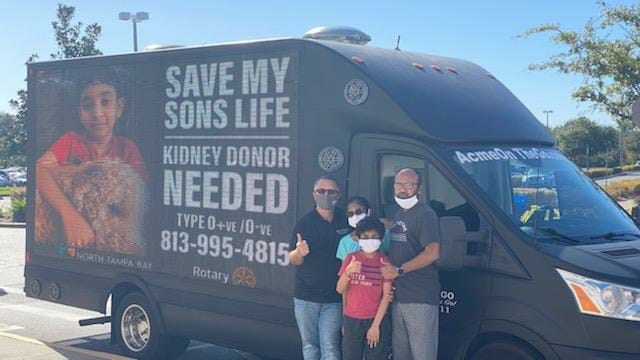
Raj Guntuku is like many 13-year-old boys — always smiling, always moving, whether he’s dancing, shooting hoops, playing video games or chasing Benji, his 70-pound Golden Doodle, around the house.
He is a second-degree blackbelt in karate, which he has been practicing since he was only 5. He loves watching videos to learn tricks like juggling and dice stacking to show his family. And, he can solve a Rubik’s Cube in mere seconds (16, to be exact).
However, unlike many 13-year-old boys, Raj’s kidneys are failing him. In October, he was diagnosed with chronic kidney disease (CKD), which is characterized by the gradual loss of kidney function. Doctors say Raj is in Stage 5, and his kidneys are now operating at less than 10-percent of normal function and will not recover.
His family has turned to social media, as well as their Buckingham neighborhood in Tampa Palms, to help find a transplant donor — going door-to-door and handing out flyers asking for help. If there is an available live kidney donor out there for Raj, his dad Nehru, mom Radha and sister Bhavika are intent on finding them.
“It’s four people, but one of us has to be with him, so we spread out as much as we can, house to house, ringing door bells,” Radha says.
More than 90,000 people nationwide are on a waiting list for a kidney donor. Raj is on the waiting list at Tampa General Hospital, where he receives dialysis on Mondays and Fridays, and sometimes on Wednesdays if his body requires it.
In a short span, Raj — or Bunny to his family and close friends — went from a kid with boundless energy to one visibly struggling with an undetected illness.

In early September, he vomited upon waking up, which his parents attributed to returning to a school schedule after a summer of sleeping in.
But then, it happened again a few weeks later, and then another time after that. For a moment, Radha says she feared Raj had contracted Covid.
It was discovered that Raj had lost 8 pounds since his last visit in March to the pediatrician, but everyone in the family had lost weight during Covid because they hadn’t been eating out. His doctor thought it might be a stomach flu, and Raj was put on a stricter diet heavy on liquids.
It didn’t help. His doctor ran some blood tests, and did not like the results, Radha says.
“They were way off,” she says.
However, another test confirmed the numbers and, after a visit to Tampa General Hospital for more testing, it was determined on Oct. 7 that his kidneys were not working and that he needed dialysis immediately.
Two days after his first dialysis treatment, Raj had a seizure. While watching television, he had suddenly frozen, biting his lip so hard it began bleeding. The doctor said the seizure was caused by his low sodium levels, so an additional dialysis on Wednesdays was added to his Monday and Friday routine.
He also developed a serious rash around the catheter in his chest, another cause for concern for his family, due to fear of infection. Raj wears socks on his hands and sleeps in between his parents, who each hold one of his hands so he doesn’t scratch the area.
“I can’t imagine all this has happened in less than (a few) months,” Radha said. “It’s crazy. Even if he coughs, or if he yawns, everyone looks around like, is he okay? It’s like living in fear. Nothing is normal.”
Raj’s parents, who are both software engineers, cannot donate their kidneys due to other health issues. Bhavika, who is 17 and a senior at King High, isn’t old enough to donate one of hers (you need to be 21).
So, Raj and his family pray that a living match can be found. While a kidney from a deceased donor is still an option, those tend to be less reliable compared to those from living donors, which are healthier and usually function immediately, as opposed to taking days or even weeks to begin functioning on their own.

The longer the lifespan and healthier the kidney, the better for Raj, who will almost certainly need another transplant in 15-20 years.
“He will have to undergo the process again, so if a transplant can last for at least 20 years, he can get back to his normal life,” Radha says.
A normal life that includes sports, dancing and chasing Benji around the house, like a regular 13-year-old. While not a day goes by that she doesn’t worry, Radha says her boy has another trait shared by many 13-year-old boys.
He is fearless.
“I did not expect it out of him, to be honest,” she says. “I am really really surprised how he is able to take all this. When I go to the hospital I am more scared and more tense, and he is doing much better than me or my husband. But, everyone is praying for him. And I think the prayers are what are making him be strong.”
The kidney donor for Raj must have O+ or O- blood, be between the age of 21-49 and not be diabetic or have any known kidney issues. Visit tgh.org/services/transplant/kidney-transplant/living-kidney-donor-program for more information.
If you know someone or would like to help, call (813) 748-7235 or (813) 995-4815.




No comment yet, add your voice below!